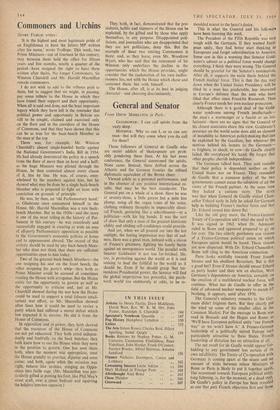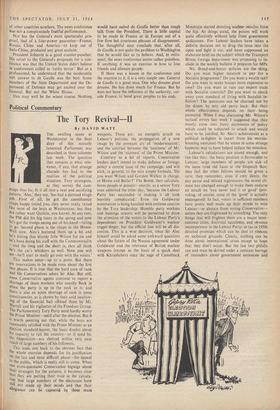General and Senator From DREW MIDDLETON ill Paris : GLENDOWER
: I can call spirits from the vasty deep.
HOTSPUR : Why so can 1, or so can any man—but will they come when you do call for them?
Those followers of General de Gaulle who are secret addicts of Shakespeare are prob- ably pondering these lines. At his last news conference, the General summoned the spirits. None came. Instead, there drifted across the Atlantic and the German frontier the refined diplomatic equivalent of the Bronx cheer. - Viewed solely as a personal performance, and in the absence of any positive international re- sults, that may be the best standpoint. The General put on a whale of a show. Here he was at seventy-three, a little greyer. but a mite less plump, using all the organ tones of his voice, clothing ordinary thoughts in impeccably classi- cal French, gesturing like a schoolmaster—or a politician—with his big hands. It was the sort of show that only a man of the greatest histrionic ability and abiding self-confidence could provide.
And yet, when we all poured out into the hot sunlight, the lasting impression was that of sad- ness. Here was a great man, imbued with a vision of France's greatness, fighting his lonely battle against an unresponsive world. The parallel with Senator Goldwater is not too far-fetched. He, too, is protesting against the world as it is and seeking to lead the faithful to the world as it should be. Even if he should grasp that tre- mendous Presidential power, the Senatqr will find the global imperatives too powerful, the patch- work world too stubbornly at odds, to be re-
moulded nearer to the heart's desire.
This is what the General and his followers have been learning this week. • The President of the Fifth Republic was very tough with the Germans. If they wanted Euro- pean unity, they had better start thinking as Europeans and forget subordination to America.
Some saw in this a warning that Senator Gold- water's advent as a political force would change everything. I think they were wrong. The General should be grateful for the Senator's nomination.
After all, it supports the main thesis behind the French nuclear force. This is that the day may dawn when the United States Presidency will be filled by a man less predictable, less interested in Europe's defence than the men who have tilled that office since Franklin Roosevelt. Thus clearly France needs her own nuclear protection.
Although there is a good deal of the Gold- water syndrome among French intellectuals—
the man's a warmonger or a fascist or an iso- lationist--there are no signs that the General or his closest associates shale this view. Goldwater's presence on the world scene does add an element of instability to American policy-making that can be exploited by the Gaullists, but whatever the motives behind his lecture to the Germans— to frighten, to shock, to cow—de Gaulle clearly failed. He overplayed his hand. He forgot that other peoples cherish independence. The Germans talked back. They said roundly that their policy is dependent neither on the United States nor on France. They reminded de Gaulle that a common policy of the two governments cannot mean the adoption of all the views of the French partner. At the same time they leaked a curious story. The story was that when General de Gaulle visited Chan- cellor Erhard early in July he asked forGerman help in building France's nuclear force and that Dr. Erhard turned him down flat.
Like the old grey mare, the Franco-German Treaty of Co-operation ain't what she used to be. It was signed in 1963, when Dr. Adenauer ruled in Bonn and appeared prepared to go on for ever. The two elderly gentlemen saw visions of a Franco-German political union on which European union would be based. These visions are now dispersed. With Dr. Erhard Chancellor, Bonn will cling to the American connection.
Paris looks wistfully towards Franz Joseph Strauss and his ebullient Bavarians. But is this a good bet? Even if Strauss should unseat Erhard
as party leader and then win an election, West Germany's dependence on America, certainly on
the creation of a multilateral nuclear force, will continue. What has de Gaulle to offer in the field of advanced nuclear weaponry to match it? Nothing, it appears, until after 1970.
The General's minatory remarks to the Ger- mans didn't frighten them. But they clearly put
the wind up some of his smaller allies in the
Common Market. For the message to Bonn was read in Brussels and the Hague and Rome as 'We'll have European political unity "our French way" or we won't have it.' A Franco-German leadership of a politically united Europe isn't particularly attractive to these States. French leadership of dictation has no attraction at all.
The net result for de Gaulle would appear for- bidding to any government less certain of its own infallibility. The Treaty of Co-operation with Germany is coming apart at the seams and no amount of visits between minor Ministers to Bonn or Paris is likely to put it together again. The movement towards European political unitY, long faltering, is, for the moment, at a dead stop. De Gaulle's policy in Europe has been revealed as one that putt French objectives first and thosc
of other countries nowhere. The news conference was not a conspicuously fruitful performance.
Nor has the General's most spectacular pro- posal, that of a four-power guarantee—France, Russia; China and America—to keep out of Indo-China, produced any great acclaim.
President Johnson is a good counter-puncher. His retort to the General's proposals fora con- ference was that the United States didn't believe in conferences called to 'ratify terror.' But as a professional, he understood that the moderately soft answer to de Gaulle was the best. Some members of the State Department and the De- partment of Defence may get excited over the General. But not the White House.
This may well be the wisest course. Nothing would have suited de Gaulle better than tough talk from the President. There is little capital to be made in France or in Europe out of a few firm but courteous phrases of disagreement. The thoughtful may conclude that, after all, de Gaulle is not quite the problem to Washington that he would like us to believe. And, in retro- spect, the news conference seems rather pointless. If anything, it was an exercise in how to lose friends and alienate people.
If there was a lesson in the conference and the reaction to it, it is a very simple one. General de Gaulle is a great man. One who dreams great dreams. He has done much for France. But he does not have the influence or the authority, out- side France, to bend great peoples to his ends.































 Previous page
Previous page